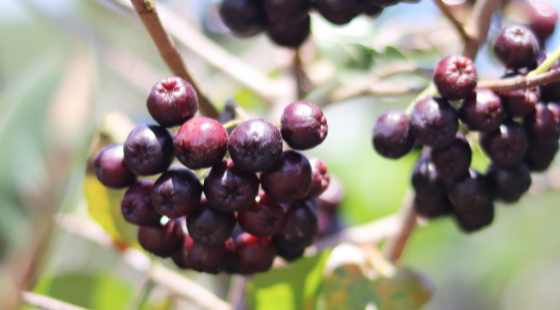
A popular superfood in recent years, the acai berry is a round fruit with dark purple skin, yellow flesh, and a large seed inside. Technically, it’s not even a berry! Since it has a central pit rather than multiple small seeds inside, it is considered as a “drupe,” similar to an olive or a plum.
Acai berries are native to Central and South America, grown largely in the Amazon region of Brazil. Since their shelf-life is very short as a fresh fruit, they are often found sold in stores as a fruit puree, dried powder, or fresh juice. The taste can be described as a cross between a blackberry and unsweetened chocolate.
Acai Berries Are Packed With Nutrients
A 1.5 tbsp (10g) serving of acai berry powder contains:
- 70 calories
- 1g protein
- 5g fat
- 4g carbohydrates
- 3g fibre (1)
Most of the fats are unsaturated, including omega 3, 6, and 9. It is also rich in calcium, iron, magnesium, zinc, copper, and manganese (2).
Acai Berries Are Antioxidant Powerhouses
Many of acai berries’ benefits are likely related to the high levels of polyphenols. Polyphenols are micronutrients found in plant-based foods that are loaded with antioxidants and can lead to an array of health benefits.
The main polyphenol in acai berries is anthocyanin, which is what gives the berry its deep purple colour (3). Anthocyanin has potent antioxidant properties, protecting cells against certain types of damage, as antioxidants play a key role in neutralizing free radicals in the body. This helps protect the body against diseases such as atherosclerosis, diabetes, and cancer. (4)
What Are The Top 4 Health Benefits Of Acai Berries?
Acai Berries May Help Protect Against Cancer
Antioxidants in general have cancer fighting properties, since they neutralize free radicals in the body that may otherwise cause harm to your cells. It is recommended to get antioxidants from whole foods, such as fruits and vegetables (5).
Acai berries have also specifically been found to kill cancer cells. One study found that extracts from acai triggered a response in leukemia cells to self-destruct (6). This was a cell-culture model, so more research is needed on humans, but these results are encouraging.
Acai Berries May Help Manage Cholesterol
Acai may also have heart health benefits. Animal studies have shown that supplementation with acai pulp can reduce levels of LDL cholesterol (the “bad” cholesterol), since they contain plant sterols that prevent the absorption of dietary cholesterol in the body. (7)
Acai Berries May Help Balance Blood Sugar Levels
Another small study found that after eating acai twice a day for one month, participants had lower insulin and fasting blood sugar levels than when they started (8). There are multiple studies noting that sufficient intake of antioxidants can exert beneficial effects in diabetes patients (9), so it is plausible that a high antioxidant food such as acai berries could exhibit a blood sugar balancing effect as well.
Acia Berries Can Help Support Brain Health
Acai may also be good for your brain as well. The polyphenols found in acai berries can protect brain cells from oxidative stress and inflammation, which can have a positive impact on brain function and cognition. Acai also supports a process used by the body called “autophagy,” which is how the body removes damaged and toxic cells in order to stimulate the growth of new, healthy cells in the brain (10). Think of it as “cellular pruning”. This process can protect against diseases like dementia and cancer.
How to Eat Acai Berries
Acai berries are most commonly found in health food stores as a fruit puree, dried powder, fresh juice or as an acai berry supplement. These can be easily added to smoothies, smoothie bowls or mixed into your oatmeal or yoghurt for an antioxidant boost.
You might be interested to know that acai is pronounced ah-sigh-EE, so now you can go forth and order your acai bowl with confidence!
References:
1. https://fdc.nal.usda.gov/fdc-app.html#/food-details/1064123/nutrients
2. https://pubmed.ncbi.nlm.nih.gov/24555649/
3. https://pubmed.ncbi.nlm.nih.gov/15030208/
4. https://pubmed.ncbi.nlm.nih.gov/7619452/
5. https://www.cancer.ca/en/prevention-and-screening/reduce-cancer-risk/make-healthy-choices/eat-well/antioxidants-and-phytochemicals/?region=on
6. https://news.ufl.edu/archive/2006/01/brazilian-berry-destroys-cancer-cells-in-lab-uf-study-shows.html
7. https://pubmed.ncbi.nlm.nih.gov/20022468/
8. https://pubmed.ncbi.nlm.nih.gov/21569436/
9. https://pubmed.ncbi.nlm.nih.gov/10580429/
10. https://faseb.onlinelibrary.wiley.com/doi/abs/10.1096/fasebj.25.1_supplement.213.8





